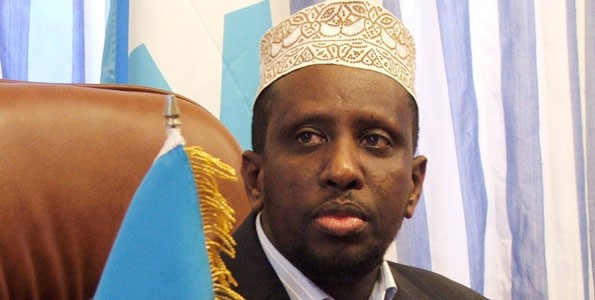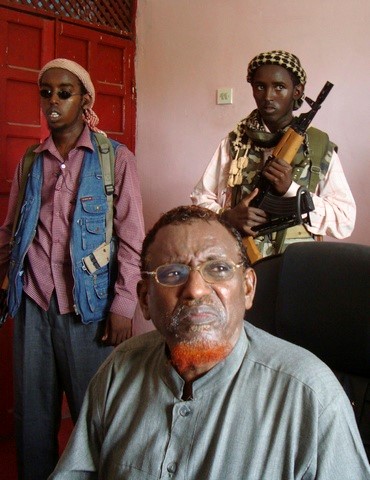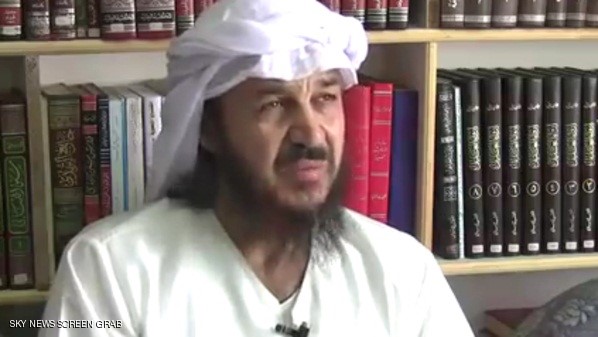Andrew McGregor
A speech delivered at the conference – “The Changing Strategic Gravity of al-Qaeda,” National Press Club, Washington D.C., December 9, 2009
There are many forces at work in Somalia today that are intentionally or unintentionally tearing the country apart. Already afflicted by the scourges of clanism, tribalism, and separatism, Somalia is now being divided by the one factor that has always united it in the past – religion.
 President Shaykh Sharif Shaykh Ahmed (Reuters)
President Shaykh Sharif Shaykh Ahmed (Reuters)
With some exceptions, such as the Muslim Brothers, political Islam in Somalia is social activist rather than intellectual in nature. None of the militant Islamist movements in Somalia have produced any comprehensive statement of ideals and methods, least of all al-Shabaab, whose internal and external political program appears to consist largely of issuing threats against their opponents and neighbors. President Shaykh Sharif Shaykh Ahmad appears to be one of the most thoughtful of Somalia’s Islamists, yet he has been strikingly unsuccessful in presenting a political program capable of capturing the imagination of Somalis. His implementation of Islamic law in Somalia means little so long as the TFG [Transitional Federal Government] controls only a few neighborhoods in Mogadishu.
In Somalia, the application of Islamic law in all legal matters is a major innovation. Until recently Somalis followed a customary law known as “Heer,” administered by elders rather than the government. Shari’a was reserved for family and inheritance cases. The imposition of Shari’a thus represents an extension of central authority into an essentially stateless society. The hasty implementation of Shari’a, however, has been done without the establishment of any consensus regarding the school of Islamic jurisprudence to be followed, among many other unsettled issues. Islamic law in south Somalia remains in the hands of the gunmen of the various armed opposition groups, who apply their own interpretation of Shari’a on an improvised basis.
Al-Shabaab’s Islam is of the Takfiri variety – in other words it seeks out all those who disagree with its crude variety of Salafism and condemns them as infidels. Needless to say, this is very polarizing and creates more enemies than friends, particularly in a country in which Salafism is a recent and unfamiliar intruder. This inflexibility in matters of religion is the main reason al-Shabaab has not yet taken Mogadishu and expelled the Transitional Federal Government. Instead of taking the capital last year, al-Shabaab chose to carry out a series of needless and unprofitable provocations against the vast Sufi religious community in Somalia, sparking the creation of a formidable Sufi militia dedicated not so much to the preservation of the TFG, as to the eradication of al-Shabaab. The Sufi militias are the militant expression of those Somalis who reject the introduction of the unfamiliar and untraditional Salafism promoted by al-Shabaab’s leaders.
 Shaykh Hassan Dahir Aweys (Biyokulule)
Shaykh Hassan Dahir Aweys (Biyokulule)
The Takfiri approach of declaring a Muslim an apostate is based on a 13th century fatwa by Shaykh Ibn Taymiya, which declared an approaching but nominally Muslim Mongol horde as insincere in their allegiance to Islam, giving the Mamluk regime of Egypt and Syria the license they needed to combat fellow Muslims. Al-Shabaab uses the apostate designation liberally, compelling Shaykh Hassan Dahir Aweys, the leader of rival Islamist movement Hizb al-Islam, to condemn the “careless” and “detrimental” use of the term after al-Shabaab began applying it to Hizb al-Islam leaders. According to one such leader in the Juba region [Shaykh Abdinasir Serar], “al-Shabaab are after us because they regard us as infidels and they believe that anyone who opposes their policy has deserted the religion.”
In Sufi-dominated Islamic societies it is customary for the graves or tombs of noted Sufi shaykhs to become shrines and even places of pilgrimage for members of the Sufi orders. Salafists condemn this practice as un-Islamic and a violation of monotheism. In Somalia, al-Shabaab has engaged in the destruction of tombs belonging to venerated Sufi “saints.” In early December, 2008, al-Shabaab destroyed the tombs of several Sufi shaykhs in Kismayo, claiming Somali Sufis were worshipping the dead rather than God.
Again this year, just as al-Shabaab seemed ready to expel the TFG, it turned against its ally, the Hizb al-Islam Islamist militia, breaking its power-sharing agreement in the port of Kismayo. When the larger Hizb al-Islam movement objected, al-Shabaab began diverting resources to a new conflict with their former partners. A large al-Shabaab offensive in South Somalia in recent weeks has driven many Hizb al-Islam fighters out of the Juba valley across the border into the ethnic-Somali region of northeast Kenya. At the same time, the Sufis have mounted their own offensive against al-Shabaab in the adjacent Gedo region.
What separates al-Shabaab from the other movements in Somalia is the relentlessness of its attacks; Shabaab assassins are everywhere, tossing grenades into meetings of its rivals, gunning down politicians or driving bomb-laden vehicles into various security headquarters with devastating results. Two attempts have been made on the president this fall alone. Even mosques have become the target of bombs and grenades, a disturbing trend that follows patterns already seen in Iraq, Pakistan and Sudan. This ruthless tactical approach, which takes little heed of the lives of innocents, is beginning to resemble the worst excesses of the late Abu Musab al-Zarqawi’s al-Qaeda in Iraq – an explosion of almost senseless brutality inflicted on fellow Muslims.
In mid-November, Hizb al-Islam officials met with senior religious scholars in Mogadishu to examine ways of having the scholars play a more active role in resolving the conflict. The meeting was something of a breakthrough, since Hizb al-Islam is only one of a number of Islamist factions, including al-Shabaab, that have routinely ignored the fatwa-s of the religious scholars calling for an end to the fighting in Somalia. Shaykh Hassan Dahir Aweys, has given the TFG a list of demands to be met if Hizb al-Islam is to join a coalition government, an action sure to incite his partners in al-Shabaab, who refuse to have anything to do with the government in Mogadishu. Unfortunately for the shaykh, his power base is melting away as his followers turn their weapons over to al-Shabaab or flee to Kenya.
While al-Shabaab has received the verbal support of the core al-Qaeda leadership, including Osama bin Laden, Ayman al-Zawahiri and Abu Yahya al-Libi, there are others in the Salafi-Jihadi movement who have cautioned al-Shabaab about their divisive approach.
After Hizb al-Islam and al-Shabaab came to blows over custody of two French intelligence agents snatched from their hotel in Mogadishu earlier this year, jihadi websites carried a long posting from so-called “Honest Scholars of Islam” advising the mujahideen to avoid disagreements and internal divisions. In their words; “Nothing is more harmful to jihad than division and conflict… You should know that uniting your ranks, words, and groups is more effective against the enemies of God almighty than dozens of operations… Beware of being lured into side battles that will exhaust you, weaken your power, disperse your efforts, and distract you.” The focus should remain on preparing for victory and empowerment. The scholars ask the Somali mujahideen to look to the future; if division and conflict occur now over the ruins of Mogadishu, “Imagine what will happen if you start fighting over money, leadership and power…?”
Kuwait’s Shaykh Hamid al-Ali, one of the leading voices of Salafist ideology, says that the mujahideen must make greater efforts to win the Somali people over to their side. They must inform the people of their aims, and assure them that they are merely the continuation of the Islamic Courts Union, that ruled briefly in 2006, with, as Hamid al-Ali says, “reason, wisdom and righteousness.” Addressing al-Shabaab’s tendency to resolve all disputes by force, al-Ali reminds them that; “Power is used when it is needed and wise political action also has its place.”
Hamid al-Ali insists the transitional government of Shaykh Sharif is only an “Islamic façade” for a regional American plan. The president has added Islamic figures to his government, but these scholars either do not know the truth about him or have deceived themselves into thinking they will find the solution to Somalia’s troubles within “the framework of the ‘Muslim-American’ plan,” as he calls it. He compares the African Union force protecting the president to the NATO forces that guard the palace of Hamid Karzai in Afghanistan. According to the Shaykh, the president’s implementation of Shari’a was only an attempt to buy time until AFRICOM can achieve its objectives in Somalia and the Horn of Africa.
Jordanian Salafi-Jihadi ideologue Abu Muhammad al-Maqdisi, the former mentor of Abu Musab al-Zarqawi, condemns Shaykh Sharif as an agent of the Antichrist [al-Masih al-Dajal] whose version of paradise is an “American hellfire of AIDS, moral deterioration, economic corruption, social ruin, and rejection of God`s laws.” The remarks followed the Somali President’s attack on the terrorist and takfiri tendencies of al-Shabaab. According to al-Maqdisi, the American campaign against terrorism is nothing less than “a war on Islam and jihad.” He rejects criticism of al-Shabaab’s unpopular implementation of severe hudud punishments for violation of Islamic law, citing a saying that applying one hudud sentence is better for the people than a week’s worth of rain. He goes on to describe the Saudi Wahhabi scholars who reject the “exaggeration and extremism” of al-Shabaab’s version of Islamic jurisprudence in favor of a faith of mercy and compassion as advocates of the Khawarjite ideology of deception and distortion. In al-Maqdisi’s view, Shaykh Sharif has irrevocably tainted himself through association with non-believers, calling on Muslims in Somalia and elsewhere to announce their support for al-Shabaab.
Earlier this year, Osama bin Laden issued an appeal to the people of Somalia to rise up and overthrow the government of Shaykh Sharif. There are other Islamists, however, who question these short-sighted calls for political violence. A leading member of Somalia’s Muslim Brotherhood [Dr. Kamal al-Hilbawi] said, “We want to know the form of government that bin Laden and his deputy Ayman al-Zawahiri want in Somalia. They are neither satisfied with HAMAS, nor the Muslim Brotherhood organization, or the moderate leader, Shaykh Sharif Shaykh Ahmad.” Somalia’s Muslim Brothers have in turn been criticized on Salafist web forums. The Muslim Brothers opposed the Islamic Courts Union and all the active militant Islamist groups, favoring gradual and moderate Islamic reforms over political violence. One jihadi ideologue [Dr. Akram Hijazi] suggested the Brothers’ peaceful approach was designed to allow them to conserve their strength before sweeping in to seize power from other Islamist movements that have exhausted themselves fighting foreign interference.
The chairman of the Somali Sufi movement [Shaykh Sharif Shaykh Muhieddin] recently described al-Shabaab as “misguided people who have misunderstood the true values of Islam.” By contrast the Ahlu Sunna wa’l-Jamaa Sufi movement is defending a way of life threatened by, as he put it, “al-Shabaab’s madness.” For now the Sufi movement promises to lay down arms as soon as al-Shabaab is eliminated, but armed movements tend to take on a life of their own. The Sufi militants are looking for military support and training, but complain none has been forthcoming. Despite this, the Sufis have a formidable nationwide network and are determined to avenge al-Shabaab’s destruction of the tombs and shrines of their saints.
One of the most egregious examples of sectarian violence in Somalia came in August when five Pakistani preachers were killed and two wounded in an attack on a mosque in central Somalia [Galkayo]. The preachers were recently arrived members of the Tablighi Jamaat, an international conservative Islamic movement based in Pakistan. The growth of the socially conservative Tablighi Jamaat in Somalia has come largely at the expense of the local Sufi orders, but the Sufi Ahlu Sunnah wa’l-Jama’a denied being behind the murders, as did al-Shabaab. For the Tablighis, the incident was a bitter reminder of the Ethiopian slaughter of 11 Jama’at members at a Mogadishu mosque in 2008.
And what about the loyalties of the actual gunmen? Continuing defections from one group to another suggest that, in typical Somali fashion, clan identification, belonging to the political group in the ascendance and a steady income are more important factors than ideology. The TFG claims to have received a number of defecting senior al-Shabaab commanders in recent weeks, as a result of these officials having come to the conclusion that the TFG is indeed an Islamic government. President Sharif has acknowledged his government is doing everything possible to widen the rift between Hizb al-Islam and al-Shabaab, though the unintentional result of this policy may be a stronger al-Shabaab.
This sudden explosion in Islamic sectarianism in Somalia will almost certainly extend the ongoing conflict and will present a formidable roadblock to a negotiated settlement, virtually the only hope for resolution in a nation where no single force seems capable of assuming control.


